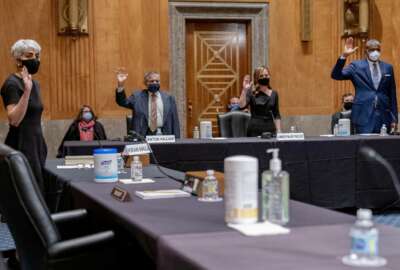
Biden selects one MSPB nominee, more will be needed though
In today's Federal Newscast, President Biden has tapped one, but only one, person to fill longstanding vacancies at the Merit Systems Protection Board.
To listen to the Federal Newscast on your phone or mobile device, subscribe in PodcastOne or Apple Podcasts. The best listening experience on desktop can be found using Chrome, Firefox or Safari.
- President Joe Biden has tapped one, but only one, person to fill longstanding vacancies at the Merit Systems Protection Board. Cathy Harris is the president’s pick to serve as MSPB chairman. Harris is an employment attorney and co-manager of a Washington-based law firm. Her nomination is a start. But the president must nominate at least one other person to begin the process of restoring a quorum at the board. The board hasn’t had a quorum for over four years. It has a backlog of over 3,000 pending cases.
- The Office of Personnel Management is one step closer to getting a new permanent director. The Homeland Security and Governmental Affairs Committee advanced the nomination of Kiran Ahujah to the full Senate for a vote. Committee members voted seven to five to advance her nomination. Ranking Member Rob Portman (R-Ohio) voted no. He says he’s concerned about Ahuja’s views on critical race theory and past statements on abortion and the Hyde amendment. Chairman Gary Peters (D-Mich.) says Ahuja is qualified to take on a challenging job. (Federal News Network)
- The Postal Service is one step away from having its first fully staffed Board of Governors in years. The Senate Homeland Security and Governmental Affairs Committee approved President Biden’s three nominees to serve on the board. Those nominees now await a full Senate vote. The nominees support many of the measures in the USPS 10-year reform plan, but are wary of steps that would reduce service in rural or underserved parts of the country. (Federal News Network)
- The governmentwide IT vendor management office is ready to come out of the shadows. Launched in October, the governmentwide IT Vendor Management Office has been setting its foundation to improve vendor engagement. Now, the ITVMO, which includes GSA, NASA, DoD, NIH and OFPP, will release its first five tools later this summer. These include vendor profiles, which will provide agencies with pricing information, specific vendors’ terms and conditions and best practices for negotiating with that vendor. Additionally, the ITVMO recently launched new integrated product teams, which will produce recommendations for working with and negotiating with specific IT vendors.
- The new and improved Beta.Sam.gov site is open for business. GSA relaunched the federal procurement portal earlier this week with a new look and feel. As a part of the redesign, GSA has a “before” and “after” video to help users understand the differences. The goal is to make the site easier to search for solicitations and less burdensome to navigate. Beta.Sam.gov will continue to be refined and new capabilities will be added in the coming months.
- Verizon has a new head of their federal business sector. Jennifer Chronis will lead the team handling the company’s federal, state, local, education and public safety customers. Chronis served for over 20 years in the Army before retiring as a Lieutenant Colonel in 2010 and previously held positions at Amazon Web Services and IBM. She has more than 25 years of digital transformation experience and will focus on all things related to IT digitalization.
- A federal judge says Amazon can continue to pursue its claim that the Pentagon’s multibillion dollar JEDI Cloud contract was improperly influenced by former President Trump. Wednesday’s decision raises the serious possibility that DoD will abandon the JEDI contract altogether. That’s because those political interference claims will raise the need for depositions by current and former government officials – including, potentially, President Trump himself. DoD told Congress in January that it would have to reassess its JEDI strategy if the court made a ruling like the one it made yesterday, because it would dramatically extend the litigation process. The multibillion dollar contract has been delayed by various court fights for more than two years. (Federal News Network)
- The Army Research Lab is using a new suite of tools to record soldiers’ biometric data. The service hopes that by collecting data on heart rate, breathing and eye movement that it can integrate weapons systems like drones into how soldiers see the world. In the future, the technology could be used to have unmanned craft explore areas of interest, or protect soldiers without being told. The lab is using virtual reality scenarios to collect the data. (Federal News Network)
- A bipartisan group of senators is joining forces to crack down on sexual assault in the military. Six senators, including Kirsten Gillibrand (D-N.Y.) and Joni Ernst (R-Iowa), are introducing new legislation to change the way the military addresses sex crimes. The bill would create an independent prosecutor position in the military to handle sexual assault, taking this issue out of the chain of command. The bill follows a recent recommendation made by the Defense Department’s independent review committee on sexual assault. The bill would also implement more assault prevention measures and give commanders better training to decrease crimes.
- Telehealth appointments are up nearly 2,000% at the Veterans Health Administration in the last year. Veterans used the program for roughly 41,000 telehealth appointments last January. VA conducted 965,000 virtual appointments last month alone. The department says it doubled its bandwidth and moved its existing VA Video Connect platform to the cloud to support the expansion. It also increased the number of staff supporting the telehealth help desk by 500%. (Federal News Network)
- President Biden is calling for a reinvestment in the IRS. The administration is calling for an $80 billion investment in enforcement capabilities over the next decade. The goal is to shrink the tax gap between what taxpayers owe and what the agency is able to collect. The Treasury Department says that gap is growing, and will total $7 trillion over the next 10 years. The White House expects the investment will bring in $700 billion in tax revenue over the same period of time. (Federal News Network)
Copyright © 2025 Federal News Network. All rights reserved. This website is not intended for users located within the European Economic Area.
Eric White
Eric White is news anchor and Federal Drive producer at Federal News Network.
Follow @FEDERALNEWSCAST
Related Stories
Getty Images/iStockphoto/Gradivis

Senate committee approves USPS board picks committed to 10-year reform plan
(AP Photo/J. David Ake)





